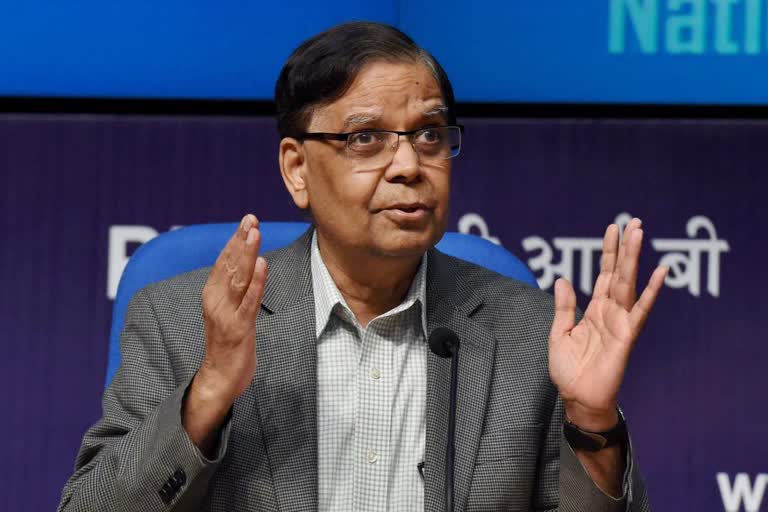New Delhi: The 'number one'challenge before the government, once it unlocks the economy amid the COVID-19 crisis, will be to put the financial sector back on its feet, former Niti Aayog Vice-Chairman Arvind Panagariya said on Monday.
In an interview to PTI, Panagariya further said that India is facing a health crisis that has led to a sudden stop of the economy.
"To restart and return the economy to the pre-COVID-19 path, we need to overcome the health crisis.Once this is done, the main weakness we will need to overcome is the one we had left unsolved prior to COVID-19: disruptions in the financial markets."
"Getting the financial sector back on its feet will remain the government's number one challenge once we unlock the economy," he said.
The nationwide lockdown was first announced by Prime Minister Narendra Modi on March 24 for 21 days to contain the spread of the novel coronavirus. The lockdown was first extended till May 3 and then again till May 17. It was further extended till May 31 and now has been extended in containment zones till June 30.
The home ministry on Saturday said 'Unlock-1' will be initiated in India from June 8 under which restrictions will be relaxed to a great extent, including the opening of shopping malls, restaurants and religious places.
Replying to a query on India's current macroeconomic situation, the eminent economist said that once normal functioning of life without masks and social distancing becomes feasible, growth will resume fast.
"Can we assess quantitatively where the GDP in 2020-21 will end up? I think not.There is simply too much uncertainty regarding when we will be able to begin functioning normally without masks and social distancing.
"It is all going to depend on when a vaccine against novel coronavirus and a cure for COVID-19 become available or when the virus would go into remission on its own,"Panagariya, a professor of economics at Columbia University, emphasised.
Read more:RBI should think out of the box to salvage corona ravaged economy
On how is reverse migration going to affect the economy, particularly,the rural sector, he noted that migrant workers will return to host states as fast as they left them once the government allows free movement of people and transportation becomes easily available.
"The nature of migrant workers is to rush to home when their workplace is shut down and rush back to the workplace as soon as it opens up.
"Just as the host states found it impossible to hold migrant workers back once their states went into lockdown, home states will find it hard to hold them back once host states unlock and resume work,"Panagariya said.
Lakhs of migrant workers in metro cities returned to their native villages after the nationwide lockdown was introduced on March 25.
In the longer run, Panagariya stressed that the problem India needs to solve is the creation of a sufficiently large number of well-paid jobs for farmers who want to leave their tiny farms to seek a better living in industry and services.
Asked whether he was satisfied by the pace of privatisation, Panagariya said, "Vested interests and socialist mindset have kept the process of privatization from moving forward even though the Prime Minister and his cabinet had blessed it as far back as 2016."
He pointed out that COVID-19 has shown that the government needs to do a lot more in the area of health than it has been doing to-date.
"But can it do so efficiently without withdrawing from other activities? Not in my view."
"The natural activities from which to withdraw to focus better on health is manufacturing that serves no public purpose and is best carried out in the private sector," the eminent economist opined.
Panagariya, who recently wrote a book'India Unlimited: Reclaiming the Lost Glory', also appreciated the government for announcing numerous reforms that will help improve the efficiency of the economy in the medium to long run.
"These reforms had been awaited for decades. I hope the announced reforms actually happen rather than shelved once the crisis is over," he said.
When asked about criticism by some experts that India needed additional expenditure and not liquidity infusion, Panagariya defended the government's recently announced measures, arguing that fiscal stimulus, which works by creating demand, cannot go far when there are no workers to help generate a supply response.
He suggested that while novel coronavirusis on a rampage, the government needs to ramp up health infrastructure to deal with the virus;ensure that the basic needs of people such as food and shelter are met; and provide enough liquidity so that solvent firms do not go bankrupt before the economy opens up.
"Various packages that the government announced have focused precisely on these three items," he asserted.
Last month, the government announced a Rs 20.97 lakh crore economic package, which included RBI's Rs 8.01 lakh crore worth of liquidity measures.
Sitharaman had unveiled the package in five tranches, which included Rs 3.70 lakh crore support for MSMEs, Rs 75,000 crore for NBFCs and Rs 90,000 crore for power distribution companies, free foodgrains to migrant workers, increased allocation for MGNREGS, tax relief to certain sections and Rs 15,000 crore allocated to the healthcare sector.
(PTI Report)



